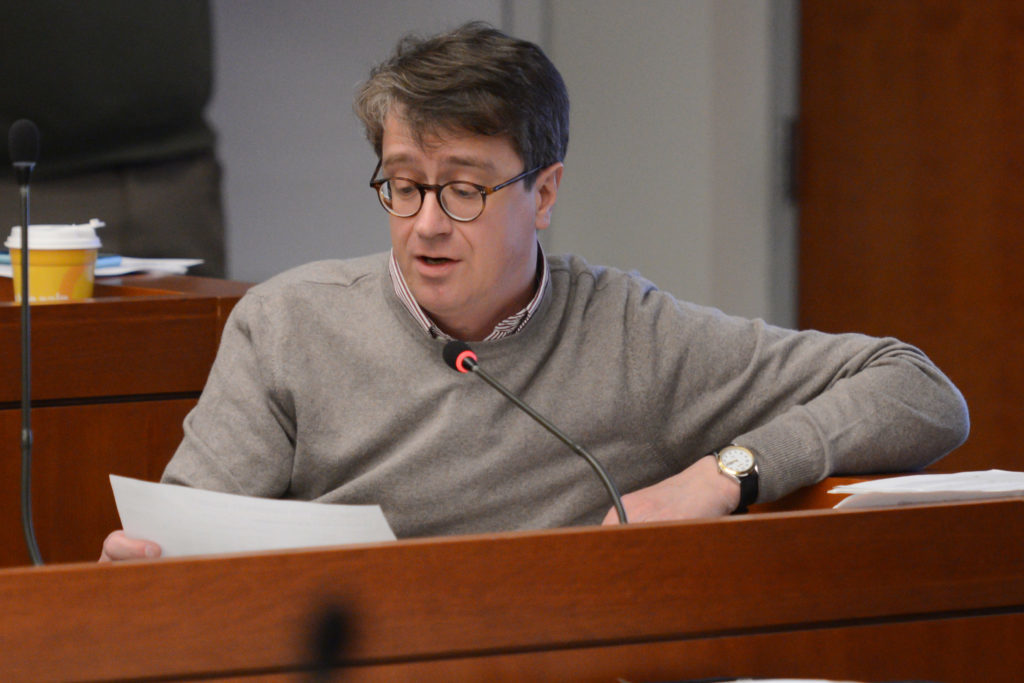The University’s chief academic officer is encouraging departments to cut the average faculty contract from five to three years.
In a hiring memo issued to deans and department chairs in February, Provost Forrest Maltzman told faculty that contract offers and renewals “should ideally be made for a maximum of three years.” Members of the Faculty Senate criticized the memo, which was obtained by The Hatchet, at a Faculty Senate meeting earlier this month – saying the move sends a message that the University is more willing to hire and fire professors.
Maltzman said at the Faculty Senate meeting last week that three-year contracts are the “norm” at GW, and most faculty contracts are not evaluated every five years. He said he did not know how many faculty are currently on five-year contracts versus three-year contracts when Faculty Senate members inquired about current staff agreements.
“In general, we don’t want forever commitments, and we have actually run into problems before where someone gets renewed and for some reason – frequently a bad reason – you don’t want that person there, and then you have to keep them for five years,” Maltzman said.
Maltzman said to avoid any mistakes with faculty contracts, the University plans to standardize three-year contracts, and departments across campus can ask Christopher Bracey, the vice provost for faculty affairs, for individualized exemptions.
“What I don’t want happening is we have this person, we hired them on a tenure-track line, we told them we could have a seven-year contract, and we’ve now had them for four years or five years and they never published anything again,” Maltzman said.
University spokeswoman Maralee Csellar said “most faculty” sign onto contracts that are three years or less, and all faculty appointments must be approved by the provost’s office.
She declined to say why the provost decided to issue the memo, how changing the length of contracts impacts faculty, how departments can obtain an exception to the three-year standard and how the change will impact faculty who must review contracts more frequently. She declined to say what feedback officials have heard from faculty about the policy and how they have responded to it.
Harald Griesshammer, an associate professor of physics and member of the Faculty Senate, said the new policy is a “negative” change because it tells faculty they have less time to retain their position.
“Not only will contract faculty be evaluated more frequently, but whether that was the intent or not, it does contain a message that we want to be able to hire and fire you more quickly and easily,” he said.
He added that a contract evaluation every three years will limit contract faculty’s ability to become invested in GW since they will only be able to commit two years of work, providing faculty less time to figure out their job situation rather than spending four years working under a five-year contract.
“For a sweeping change like that, the best policy is to inform those concerned directly, namely contract faculty,” Griesshammer said. “Instead, it was left to department heads to explain a policy for which they had no guidance, let alone input. GW still does a lousy job to communicate that its employees are appreciated.”
Griesshammer added that there are programs, like the Writing Center, that will be negatively impacted by this policy because they hire mostly contract faculty.
“Bureaucratically, you’ve doubled the load of the retention committee from going from five-year to a three-year contract,” he said. “Even the vast majority of the Columbian College is on five-year contracts.”
The retention committee evaluates non-tenure faculty regularly through a series of observations and written reports.
He added that contract faculty can be let go when their contract ends and three-year contracts provide more flexibility for department heads during budget crunches.
Phyllis Ryder, an associate professor of writing and the director of the Writing Center, said she was not notified about the change until May 10 and is skeptical about shorter evaluations, since it would require contract faculty to prepare for evaluations more frequently.
“We have dozens of faculty in contract positions, and as a program, we have to prepare and review a large number of contracts each year and now we will have to do this more frequently,” Ryder said. “I don’t see any benefit to the more frequent reviews.”
She said the more frequent review cycle will take time away from students and research, because faculty will worry about their contracts not being renewed.
“I cannot know why the administration would want to cut the contract length time,” Ryder said. “Without hearing any other explanation, I can only presume that the administration would like more flexibility to cut positions.”
Arthur Wilson, an associate professor of finance and member of the Faculty Senate, said switching contracts for faculty from five years to three years undercuts contract faculty’s role at GW because they have less time to prove themselves prior to evaluation.
“There are quite a few contract faculty who are integral for the program they’re involved in,” Wilson said. “Three years undermines their commitment in the program.”




